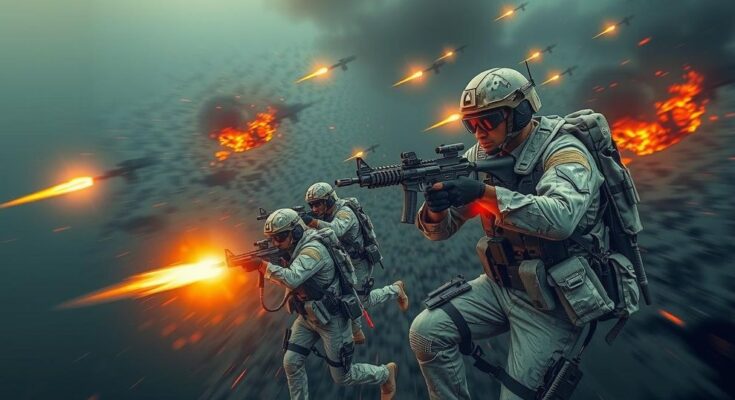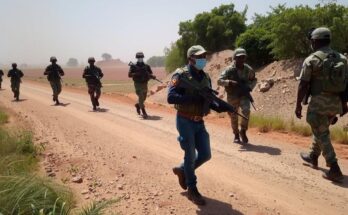Israel conducted airstrikes against a Hezbollah target in Syria, while the United States executed B-2 bomber strikes on Houthi positions in Yemen. This escalation follows heightened tensions after Iran’s missile attack on Israel and has garnered international concern over potential regional warfare and significant civilian casualties in Gaza and Lebanon.
On Thursday, Israel executed a strike on a Hezbollah position in Syria, as confirmed by a war monitoring entity, amidst an ongoing offensive against Iranian-aligned groups in the region. Concurrently, the United States launched heavy bomber attacks targeting Houthi insurgent positions in Yemen, further escalating the conflict which has recently intensified due to the war in Lebanon. This escalation follows Iran’s missile attack against Israel on October 1, 2023, which has prompted a promise of retaliation from Israel, raising global concerns of a potential wider regional conflict. Reports from Syrian state media indicate that the Israeli airstrike targeted the city of Latakia, a significant stronghold for President Bashar al-Assad, which resulted in injuries to two civilians. The Syrian Observatory for Human Rights noted that the raid aimed at a Hezbollah weapons depot. Israel’s military refrained from commenting on the operation, although it has conducted numerous strikes in Syria in recent years, particularly to disrupt Hezbollah’s supply routes. In Yemen, the US military’s aggressive actions included strikes deploying B-2 bombers against weapons storage facilities held by the Houthis. In response, the Houthis’ political bureau indicated that American military actions would not go unanswered and reaffirmed their commitment to supporting Gaza and Lebanon. Middle East security analyst Mohammed al-Basha remarked that the deployment of B-2 bombers signifies a decisive shift in US policy towards a more assertive stance against Houthi destabilization efforts. The ongoing conflict has resulted in significant casualties, with a reported 42,438 fatalities in Gaza since the beginning of the Israeli campaign, predominantly affecting civilians. In Lebanon, the death toll from the renewed hostilities has reached at least 1,373, with many more expected. Israel’s expanded military operations in Lebanon have heightened tensions, resulting in cross-border exchanges of fire with Hezbollah, who claimed the destruction of four Israeli tanks using missiles. The situation has drawn criticism towards Israel’s military activities, including from the United States, which has urged Israel to avoid actions that could jeopardize civilian lives or compromise the safety of UN peacekeepers and the Lebanese army. Recent reports from UN peacekeeping missions have raised concerns regarding Israeli strikes on healthcare facilities and even ambulances, which the Israeli military has alleged were utilized by Hezbollah for military transportation operations, although no supporting evidence has been provided for these claims. In northern Gaza, recent Israeli airstrikes on a school serving as a shelter for displaced individuals resulted in numerous casualties. Amidst these hostilities, the humanitarian crisis has intensified, with approximately 345,000 Palestinians in Gaza facing dire food shortages, as nearly the entire population has succumbed to poverty and unemployment rates have soared to nearly 80 percent.
The ongoing conflict involving Israel, Iran, Hezbollah, Hamas, and Houthi rebels underscores a complex geopolitical landscape characterized by longstanding hostilities and alliances. The region is witnessing increased military actions as Israel seeks to disrupt Hezbollah’s supply chain and retaliate against Iranian aggression, while the United States intensifies its campaign against Houthi forces in Yemen. The history of conflict between these actors has often resulted in severe humanitarian consequences, resulting in vast civilian casualties and escalated tensions in neighboring countries.
The recent military actions by Israel and the United States signify an escalation in an already volatile region marked by multiple conflicts involving Iran and its affiliates. As casualties rise and humanitarian needs deepen, the prospects for peace appear increasingly distant. The international community’s response and the adherence to humanitarian standards amid military operations will be crucial in mitigating the impacts of this ongoing conflict on civilian populations.
Original Source: www.newarab.com




